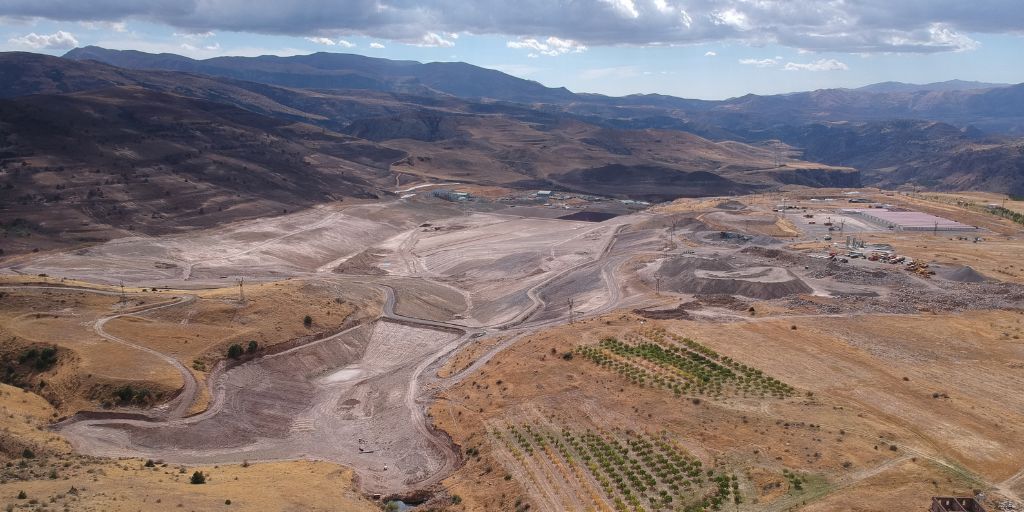Armenia’s government and investors have failed to prevent human rights abuses related to the Amulsar gold mine. As we await the outcome of an EBRD investigation, environmental and human rights defenders continue to face threats. New reports show how the policies that should protect human rights and environmental defenders have failed to stop a project whose costs outweigh the benefits.
Emily Gray, Fidanka Bacheva-McGrath, Nina Lesikhina, CEE Bankwatch Network | 4 August 2022

The Amulsar gold mine in Armenia was supposed to be a different kind of mine, a better one. It even received a loan from the European Bank for Reconstruction and Development (EBRD) to help it meet the highest environmental and social standards in mine construction and operation.
But for years, Armenian activists, Bankwatch and other international organisations have shown that this effort has failed. The mine is a risk to water, nature, health – all of which should be protected under Armenian and international law. The local tourism industry and people’s livelihoods felt the negative impacts as soon as mine construction started in 2016.
Furthermore, local activists have been punished for speaking out against the project, denied the right to peaceful assembly and association, freedom of expression, access to information, and access to justice. Amulsar has also proved ripe for corruption.
Although plenty of studies have shown that the project will bring financial benefits to Armenia, no official project study has sufficiently demonstrated the immense costs of the project.
Bankwatch’s Fidanka Bacheva-McGrath speaks at an event in Yerevan in June 2022 about the costs of the project to nature and human rights.
New reports show Amulsar risks remain
Now, a new report from FIDH, CSI Armenia and Bankwatch exposes the full extent of the failure of the Armenian government; the company responsible for the project, Lydian; and current and former investors like the EBRD and the World Bank’s International Finance Corporation (IFC) to protect, respect and fulfil human rights and remedy the negative impacts of projects.
A second report from the Coalition for Human Rights in Development also highlights the failure of the development banks to prevent retaliation against those who have spoken out against the risks and actual harms caused by the Amulsar project.
Speaking truth to power in Armenia comes at a price. An unprecedented number of SLAPPs, strategic litigation against public participation, were initiated against independent experts, lawyers and journalists that opposed the project.
Once stalled, work on Amulsar set to start again
The project has appeared dormant as of late. In 2018, 3,000 locals signed a petition calling for a ban on mining in the region, which was followed by months of protests and blockades of access roads leading to the mining area. Simultaneously, activists were mounting legal challenges to the mine in national courts and international mechanisms. Lydian International collapsed, the EBRD exited the project, and Armenia began investigating.
With the onset of the COVID-19 pandemic in 2020 and the violation of the cease-fire on the Armenia-Azerbaijan border in 2021, it was not clear where Amulsar was headed. A decision on a complaint filed with the EBRD’s Independent Project Accountability Mechanism (IPAM) is still on the way.
Yet in 2022, Lydian Armenia applied for a new water use permit. Right after, the government of Armenia amended the country’s Mining Code to make it easier to bypass public opposition, despite a joint statement against this from 44 non-governmental organisations. A supplementary regulation allows mining to proceed even in cases where civil protests against the mining occur, which seems to be a clear response to the challenges the Amulsar gold mine project has faced.
It’s just a matter of time before the issue of Amulsar is back on the doorsteps of nearby residents.
Armenian Environmental Front’s Anna Shahnazaryan speaks about the project’s environmental impact assessment and the project’s costs for Armenia.
The way forward
In June, CEE Bankwatch Network, FIDH, CSI Armenia, EcoLur and several other local civil society groups met in Yerevan for a report launch event, where they were joined by members of the international community in Armenia and representatives from the government. In addition to discussing the upcoming challenges of the project, we also discussed the way forward.
Armenia needs to uphold the rights of local communities and environmental and human rights defenders, in line with its obligations under international human rights law.
The government should revoke all existing permits for the Amulsar gold mine project; initiate an independent expert assessment of the costs and benefits of the mine; ensure proper remedy for the negative impacts caused by the mine to local communities, human rights defenders and the environment; and conduct an independent and transparent investigation into the corruption surrounding the land acquisition in Gndevaz.
The EBRD and the IFC should support the Armenian government in implementing these steps. They should also develop human rights and environmental due diligence policies in order to better comply with the UN’s guiding principles, including meaningful public participation.
Never miss an update
We expose the risks of international public finance and bring critical updates from the ground – straight to your inbox.
Institution: EBRD
Theme: Amulsar gold mine | gold mining
Location: Armenia
Project: Amulsar gold mine, Armenia
Tags: Amulsar Gold Mine | Armenia | EBRD | gold mining | human rights
